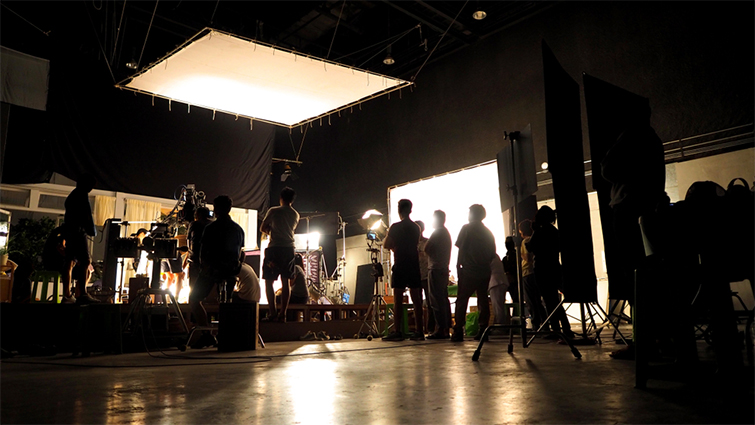
Industry Insights: Careers in Commercial, Indie, or Corporate Filmmaking
In which we take a look at the different career paths for commercial, indie, and corporate video production and filmmaking.
When I first got into filmmaking, I was lucky enough to have a mentor sit me down and ask some hard questions about what type of career I would like to pursue. The answers, which felt arbitrary at the time, would go on to shape the next five years of my life. While every career is unique, and opportunities seem to come and go for no reason at all, having a solid path to follow helps immensely.
Recently, I got to see one of these mentors sit on a panel discussion with some others who took slightly different paths. The three panel members represented careers in major-brand television commercial production, independent filmmaking, and corporate video production. It was an interesting juxtaposition, as each track has its own unique pros and cons.
While your path will always be your own, here are some insights into these three main fields to give you an idea of how to find your own way into the world of film and video production.
Commercial Production

Image via gnepphoto.
While this talk took place in Dallas, Texas, the world of mainstream commercial production in America takes place in Los Angeles (and to a lesser extend, New York). Not that you can’t have careers in other major markets, but the money (and often major players) will be coming from L.A. It’s also important to note how closely commercial work is tied to advertising agencies. This is where all the money, creative direction, and major players live.
Pros
If you stay squarely in this track, you can eventually make money and establish a decent career. When it’s truly a full-time vocation, the day-in and day-out waxes and wanes between ramping up and ramping down around a few days of hard production, which means steady work of varying time and degrees. You can also always keep moving up the chain as new opportunities present themselves, and at each level, responsibility and pay increase.
Cons
The commercial production job, especially during production, is a 24/7 lifestyle. Things move insanely fast as projects are pitched, budgeted, staffed, and started on the quickest timelines possible. When in production, days easily push 12 to 20 hours with little mental or physical breaks in between. It’s also very cliquey in the sense that producers usually work with the people they know and like. If you’re in with the right people, you’ll work non-stop, but if you’re not, it’s hard to get your break.
Advice
The insights offered by the seasoned producer on this panel were of the classic start-from-the-bottom-and-work-your-way-up variety. You begin as a PA, working 12-hour shifts for $75 a day. You show up every day on time, you stay alert on set, and you do everything required of you. From there, you earn the reputation of being reliable and smart, and you work your way up. However, because it is so cliquey, you might get only three strikes in your entire career before you’re blackballed, so you have to always stay on your toes.
Independent Features

Image via structuresxx.
For those interested in feature (or to a degree, episodic) filmmaking, the options are even more limited outside of the major hubs like L.A. The outside industry is pretty much strictly independent and often genre or niche market features. If the production is L.A.-based and shooting on-location (or in a state that currently has good tax incentives like Georgia or Louisiana), L.A. crews can still be the big players. However, if you find yourself with a good producer, they can make money, and it can be creatively satisfying work.
Pros
The biggest pros of working on independent features don’t involve money. They do, however, involve working on cooler, often more ambitious projects. (The producer at this event stressed that transport and craft services were the first line items that he’d budget for to insure that things run on time and that people are well-fed and happy on set.) You also can get some good credits to add to your resume and build out your IMDB with features, which can help you transition into other production roles later.
Cons
Unlike commercial or corporate work, independent features don’t pay very well. They’re operating on borrowed money to begin with, and the penny-pinching is very tight. Days and nights can be long, and the six-day work week can be both physically and mentally exhausting.
Advice
Even for the best reasons, independent feature work can be sporadic at best, unless you’re in one of the main filmmaking hubs. It’s also not exclusive work, so if you’d like to build out your career in other areas, opportunities to work on indie features here and there might be your best bet. Just remember that features are risky ventures to begin with, which means there’s always a chance that your work might not see the light of day.
Corporate Video

Image via Kzenon.
Perhaps the career track I’m personally most familiar with — having worked for years with a corporate video production right out of film school — is the corporate track. For markets both big and small, video production is a necessary part of business. Companies need video experts for the same reasons they need graphic artists or web designers — for work on everything from marketing to HR to company events. There’s also plenty of work to find, as the speaker on this subject explained. It’s just not always the work you’d like to be doing.
Pros
This first aspect could be both a pro or a con, but corporate work can quickly involve lots and lots of travel — whether it’s traveling around town day-in and day-out for different shoots, or booking gigs around the globe. It can be fun for a while, but it may catch up to you later. Corporate work is relatively safe work; it’s steady and can, at times, be simple (think talking-head interviews and infographic-like explainer films). You’ll also get good money and sometimes perks like insurance and access to good gear and other resources.
Cons
The travel can take its toll on you. It also can get quite boring if you don’t find ways to mix in fun projects on your own. It can also quickly become an office job where you come in and do the same edits on similar projects day after day. If complacency is your fear, it can quickly sneak up on you.
Advice
From someone who’s done a good deal of work in this industry, it’s a great avenue to explore when you’re just starting off. It takes people who are young and hungry to jump into the industry and finds them work. However, if it’s not something you’re interested in long term, try to find inroads into other career tracks right away to keep yourself interested, motivated, and always learning.
Cover image by 9387388673.
For more insights and inspiration into filmmaking and video production careers, check out some of these additional articles below.






